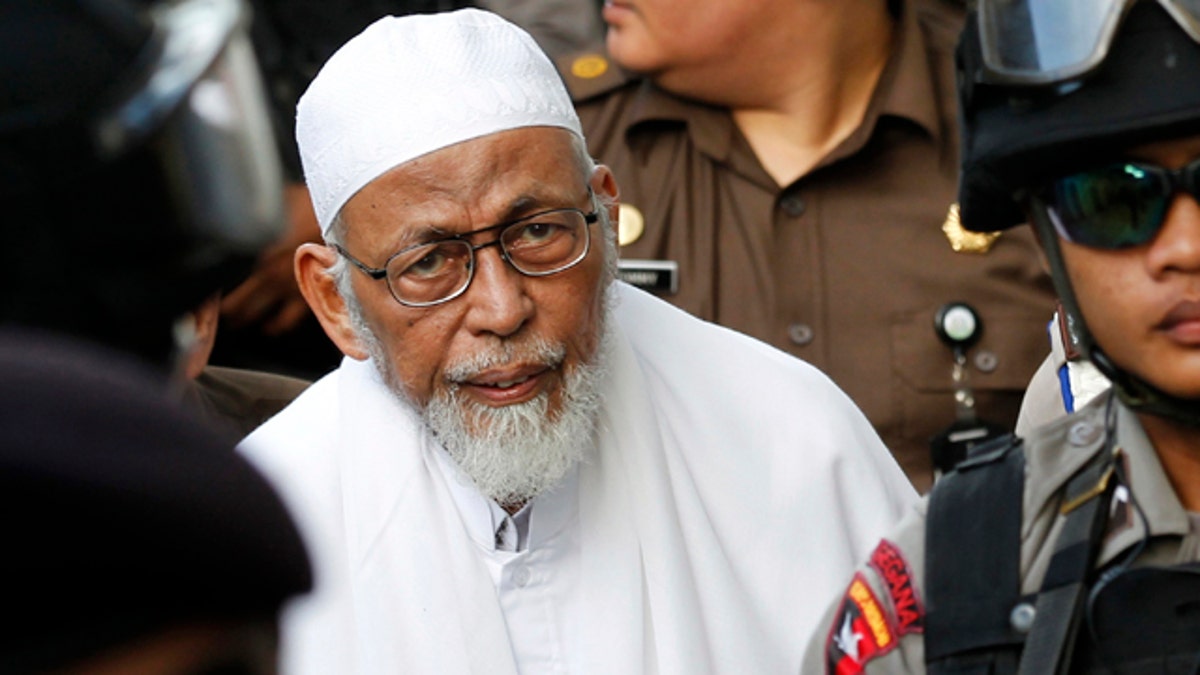
March 14, 2011: Radical Indonesian Muslim cleric Abu Bakar Bashir arrives at south Jakarta's court compound. (Reuters)
The death of Usama bin Laden has huge ramifications for Asia because he was the face and the inspiration for Muslim radicals who flocked to his cause. Bin Laden’s supporters have always been few in number, but they also have been able to implement atrocities that followed the thinking of their leader, coordinating attacks targeting civilians to wreak maximum terror.
The Bali bombings in 2002 have been, until now, the most deadly Asia has seen. More than 200 people died in the attack in the tourist district of Kuta, which involved a suicide bomb attack in one bar, a large car bomb outside another and a smaller device outside the U.S. Consulate in a nearby town. Eighty-eight of the dead were Australian and 38 were Indonesian.
An audio recording surfaced purportedly of Usama bin Laden saying that the Bali bombings were in retaliation for support of the United States' war on terror and Australia's role in the liberation of East Timor.
"You will be killed just as you kill, and will be bombed just as you bomb." "Expect more that will further distress you."
A number of members of the Al Qaeda-affiliated group, Jemaah Islamiyah, were convicted in the Bali bombings; three were sentenced to death.
The group is allegedly led by radical cleric Abu Bakar Bashir. He, though, served only 18 months of his two-and-a-half year jail sentence, because it was found in court that he only had indirect involvement in the incident. It seems when the terror gang came to him to get his blessing for a jihad in Bali, he reportedly gave his consent without asking for details of what was planned.
This allowed him to argue he didn’t know they were planning the deadly bomb attacks. Bashir, though, is currently in a jail cell awaiting the verdict of his latest trial on terrorism charges following the discovery of a new terrorist cell known as Al Qaeda of the Veranda of Mecca training in the province of Aceh on the Indonesian island of Sumatra.
Through a spokesman, Bashir said Monday he didn’t believe that bin Laden’s death would lead to the end of Al Qaeda. "We're still waiting for clarification from Al Qaeda, whether it's true or not -- that news of his death," he said."When it's true, then it will not put Al Qaeda to death. Osama's death will not make Al Qaeda dead."
The implied threat in his words seem to be that there could be attacks in response to bin Laden’s death. Security forces in Indonesia are on high alert over fears Al Qaeda-affiliated groups are planning attacks following the death of Usama bin Laden.
National Police Deputy Chief Commissioner General Nanan Sukarna told reporters: "We are monitoring the situation and anticipating all possibilities (of further attacks)."
Indonesian security forces were already on edge following uncovering a plot ten days ago to blow up a church in the capital Jakarta. Australia has issued a travel warning suggesting Australians in Indonesia limit travel outside their homes and hotels. The U.S. and Britain have issued similar travel warnings.
The Indonesian security forces have had major successes in killing or capturing a number of dangerous terrorists over the past few years, which seems to have limited the capacity of Jemaah Islamiyah to conduct operations.
The greatest success to date against terrorism in Southeast Asia was the capture of Riduan Isamuddin, better known as Hambali, here in Thailand in a joint operation by the CIA and the local police. As military commander of the Indonesian terrorist organization, he was often described as “the Usama bin Laden of Southeast Asia.” He had plans to create a huge Islamist state across the region with himself as the leader. Hambali was the main link with Al Qaeda and was a close friend of Khalid Shaikh Mohammed, who planned the Sept.11, 2001, attacks. He is currently being held in Guantanamo.
The demise of bin Laden now begs the question: Can he still inspire radical Muslims here in Southeast Asia?
Al Qaeda-linked groups have been under severe pressure here for a number of years, but they still are a real threat, particularly in Indonesia and the Philippines.
When traveling in Southeast Asia in the past, I have seen bin Laden T-shirts for sale many times. Most people selling them have no idea the revulsion it brings to people affected by the atrocities the terror leader conducted or inspired. The T-shirts have disappeared now, but the terror leader’s ideas have still not been eradicated, and the region remains on edge over fears there could be retaliatory attacks.
